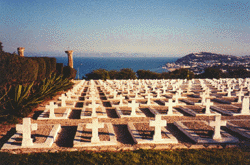 |
The Protectorate, World War II and Tunisian Independence
 |
| War Cemetry near Sidi Bou Said |
Tunisia's modern period dates from the proclamation of the French protectorate on the 12th of May, 1881. The Destour Party, or Constitutional Liberal Party, was founded in 1920, followed by the creation of the Neo-Destour Party in 1934. On the 31st of July, 1954, Tunisia won domestic autonomy and on the 20th of March, 1956, total independence. The Republic of Tunisia was officially proclaimed on the 25th of July, 1957, with Habib Bourguiba serving as the first President. The 7th of November, 1987 marks the beginning of a new era with the nomination of President Zine El Abidine Ben Ali.
Wreathes and Flowers
From November 1942 to May 1943 the Allied Powers and the Axis Forces were engaged in fighting all over the territory of Tunisia. The American Forces had their first direct contact with German troops and suffered a painful defeat in the fierce battle of Kasserine Pass. Vigorous battles involving British Troops took place in the South at the old French Mareth Line and in the North at Medjez El Bab, finally leading to the massive defeat of the Axis Troops on Cap Bon in May 1943.
To remind us of this human folly and to commemorate the lives lost are twelve World War II cemeteries: nine British, one French, one American and one German.
The American Cemetery in Carthage gathers the dead not repatriated from the North African Campaign, where nearly forty percent of the losses occurred. It also contains a memorial to thousands of missing soldiers. This cemetery is extremely well-cared for and contains detailed mosaic maps illustrating key North African battles of the war.
The nine British cemeteries contain 9,704 dead from Commonwealth countries. They are scattered throughout Tunisia in Tabarka, Béja, Bizerte, Borj El Amri, Medjez El Bab, Oued Zerga, Thliba, Enfidha and Sfax. The Medjez El Bab cemetery is the largest. |

